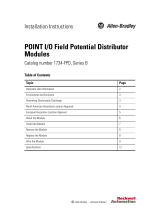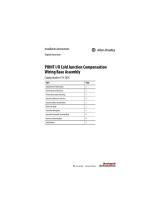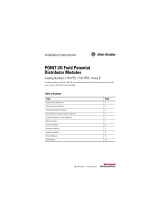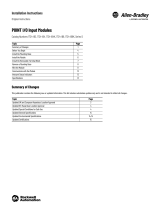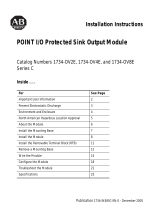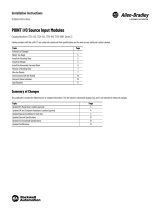Page is loading ...

Publication 1734-IN582B-EN-P - February 2005
Installation Instructions
POINT I/O ControlNet Adapter
Catalog Number 1734-ACNR
The POINT I/O ControlNet Adapter is a communications adapter for
POINT I/O modules. The adapter provides an interface for
controlling and communicating with POINT I/O modules from a
ControlNet network.
43247
Module
Status
PointBus
Status
ControlNet A
Status
ControlNet B
Status
1734-ACNR
Field
Power
System
Power
2
43247A
Safety End Cap
Removable
Terminal
Block (RTB)
RTB Removal Handle
LED Indicators
Node Address
Thumbwheel
Coaxial Channel B
Coaxial Channel A
Network
Address
Port (NAP)
DIN Rail Locking
Screw (orange)

2
Publication
1734-IN582B-EN-P - February 2005
Important User Information
Because of the variety of uses for the products described in this
publication, those responsible for the application and use of these
products must satisfy themselves that all necessary steps have been
taken to assure that each application and use meets all performance
and safety requirements, including any applicable laws, regulations,
codes and standards. In no event will Rockwell Automation be
responsible or liable for indirect or consequential damage resulting
from the use or application of these products.
Any illustrations, charts, sample programs, and layout examples
shown in this publication are intended solely for purposes of
example. Since there are many variables and requirements associated
with any particular installation, Rockwell Automation does not
assume responsibility or liability (to include intellectual property
liability) for actual use based upon the examples shown in this
publication.
Allen-Bradley publication SGI-1.1, Safety Guidelines for the
Application, Installation and Maintenance of Solid-State Control
(available from your local Rockwell Automation office), describes
some important differences between solid-state equipment and
electromechanical devices that should be taken into consideration
when applying products such as those described in this publication.
Reproduction of the contents of this copyrighted publication, in
whole or part, without written permission of Rockwell Automation, is
prohibited.
Throughout this publication, notes may be used to make you aware
of safety considerations. The following annotations and their
accompanying statements help you to identify a potential hazard,
avoid a potential hazard, and recognize the consequences of a
potential hazard:

3
Publication
1734-IN582B-EN-P - February 2005
WARNING
Identifies information about practices or
circumstances that can cause an explosion in a
hazardous environment, which may lead to
personal injury or death, property damage, or
economic loss.
ATTENTION
Identifies information about practices or
circumstances that can lead to personal injury or
death, property damage, or economic loss.
IMPORTANT
Identifies information that is critical for
successful application and understanding of the
product.
BURN HAZARD
Labels may be located on or inside the equipment
(e.g., drive or motor) to alert people that surfaces
may be dangerous temperatures.
S
HOCK HAZARD
Labels may be located on or inside the equipment
(e.g., drive or motor) to alert people that
dangerous voltage may be present.

4
Publication
1734-IN582B-EN-P - February 2005
ATTENTION
Environment and Enclosure
This equipment is intended for use in a Pollution
Degree 2 industrial environment, in overvoltage
Category II applications (as defined in IEC
publication 60664-1), at altitudes up to 2000
meters without derating.
This equipment is considered Group 1, Class A
industrial equipment according to IEC/CISPR
Publication 11. Without appropriate precautions,
there may be potential difficulties ensuring
electromagnetic compatibility in other
environments due to conducted as well as
radiated disturbance.
This equipment is supplied as "open type"
equipment. It must be mounted within an
enclosure that is suitably designed for those
specific environmental conditions that will be
present and appropriately designed to prevent
personal injury resulting from accessibility to live
parts. The interior of the enclosure must be
accessible only by the use of a tool. Subsequent
sections of this publication may contain additional
information regarding specific enclosure type
ratings that are required to comply with certain
product safety certifications.
See NEMA Standards publication 250 and IEC
publication 60529, as applicable, for explanations
of the degrees of protection provided by different
types of enclosure. Also, see the appropriate
sections in this publication, as well as the
Allen-Bradley publication 1770-4.1 ("Industrial
Automation Wiring and Grounding Guidelines"),
for additional installation requirements pertaining
to this equipment.

5
Publication
1734-IN582B-EN-P - February 2005
ATTENTION
Preventing Electrostatic Discharge
This equipment is sensitive to electrostatic
discharge, which can cause internal damage and
affect normal operation. Follow these guidelines
when you handle this equipment:
• Touch a grounded object to discharge
potential static.
• Wear an approved grounding wriststrap.
• Do not touch connectors or pins on
component boards.
• Do not touch circuit components inside the
equipment.
• If available, use a static-safe workstation.
• When not in use, store the equipment in
appropriate static-safe packaging.
ATTENTION
POINT I/O is grounded through the DIN rail to
chassis ground. Use zinc-plated, yellow-chromated
steel DIN rail to assure proper grounding. Using
other DIN rail materials (e.g., aluminum, plastic,
etc.) which can corrode, oxidize or are poor
conductors, can result in improper or intermittent
platform grounding.
WARNING
When you connect or disconnect the Removable
Terminal Block (RTB) with field side power
applied, an electrical arc can occur. This could
cause an explosion in hazardous location
installations.
Be sure that power is removed or the area is
nonhazardous before proceeding.

6
Publication
1734-IN582B-EN-P - February 2005
Before You Begin
To effectively use your adapter, note the following considerations.
Understand Messaging
Class 3 (Explicit Message) requests through the 1734-ACNR adapter to
a specific POINT I/O module may not always receive a response
from the I/O module. In the case where the I/O module does not
reply to the request, the adapter responds with an error code
indicating a time-out.
Establish I/O Connections
When you power up a POINT I/O system and establish I/O
connections, the outputs transition to the Idle state, applying Idle
state data before going to RUN mode. This occurs even when the
controller making the connection is already in RUN mode.
Configure Autobaud
The adapter cannot reconfigure an I/O module that you previously
configured to operate at a fixed baud rate. When you reuse a POINT
I/O module from another POINT I/O system, configure the module
to autobaud before using it with the 1734-ACNR adapter.
For More Information
The following related publications are available online at URL
http://literature.rockwellautomation.com.
Publication Publication Number
POINT I/O ControlNet Adapter User Manual 1734-UM008
POINT I/O ControlNet Adapter Release Notes 1734-RN004

7
Publication
1734-IN582B-EN-P - February 2005
Install the ControlNet Adapter
To install the adapter on the DIN rail prior to installing other base
units, proceed as follows.
1. Position the adapter vertically above the DIN rail.
2. Press down firmly to install the adapter on the DIN rail. The
locking mechanism will lock the adapter to the DIN rail.
3. Set the node address on the node address thumbwheel.
4. Remove the safety end cap by sliding it up. This exposes the
backplane and power interconnections.
ATTENTION
You must use Series C Point I/O modules with the
1734-ACNR. Series A and B Point I/O modules will
not work with the 1734-ACNR.
WARNING
If you connect or disconnect the ControlNet
cable with power applied to this module or any
device on the network, an electrical arc can
occur. This could cause an explosion in
hazardous location installations.
Be sure that power is removed or the area is
nonhazardous before proceeding.
ATTENTION
Do not discard the end cap. Use this end cap to
cover the exposed interconnections on the last
mounting base on the DIN rail. Failure to do so
could result in equipment damage or injury from
electric shock.

8
Publication
1734-IN582B-EN-P - February 2005
Set the Node Address
Set the node address using the 2-position thumbwheel switch. Valid
settings range from 01 to 99. Press the + or - buttons to change the
number.
Install a Replacement ControlNet Adapter to an Existing System
ATTENTION
You must use Series C Point I/O modules with the
1734-ACNR. Series A and B Point I/O modules will
not work with the 1734-ACNR.
WARNING
When you insert or remove the module while
backplane power is on, an electrical arc can occur.
This could cause an explosion in hazardous
location installations.
Be sure that power is removed or the area is
nonhazardous before proceeding. Repeated
electrical arcing causes excessive wear to contacts
on both the module and its mating connector.
Worn contacts may create electrical resistance that
can affect module operation.
Module
Status
PointBus
Status
ControlNet A
Status
1734-ACNR
ControlNet B
Status
Field
Power
System
Power
0
A
B
2
43248
Network Node
Address
thumbwheel
Press either the +
or - buttons to
change the
number.

9
Publication
1734-IN582B-EN-P - February 2005
1. Remove the existing adapter from the DIN rail as follows:
a. Disconnect the ControlNet connector from the adapter.
b. Pull up on the RTB removal handle to remove the terminal
block.
c. Remove the adjacent module from its base.
d. Use a small bladed screwdriver to rotate the DIN rail
locking screw to a vertical position. This releases the
locking mechanism.
e. Lift straight up to remove
2. Remove the safety end cap on the replacement adapter by
sliding it up. This exposes the backplane and power
connections.
3. Position the replacement adapter vertically above the DIN rail.
(Make certain the DIN rail lock is in the horizontal position.)
Slide the adapter down, allowing the interlocking side pieces
to engage the adjacent module.
4. Press firmly to seat the adapter on the DIN rail. The adapter
locking mechanism will snap into place.
5. Set the node address on the node address thumbwheel.
6. Insert the end opposite the handle into the base unit. This end
has a curved section that engages with the wiring base.
7. Rotate the terminal block into the wiring base until it locks
itself into place.
8. Replace the adjacent module in its base.
9. Connect the ControlNet cable to the adapter. Use a tap to
connect the adapter to the ControlNet cable. Do not directly
connect the adapter to the coax cable.

10
Publication
1734-IN582B-EN-P - February 2005
Wire the ControlNet Adapter
WARNING
If you connect or disconnect the communications
cable with power applied to this module or any
device on the network, an electrical arc can occur.
This could cause an explosion in hazardous
location installations.
WARNING
If you connect or disconnect wiring while the
field-side power is on, an electrical arc can occur.
This could cause an explosion in hazardous
location installations. Be sure that power is
removed or the area is nonhazardous before
proceeding.

11
Publication
1734-IN582B-EN-P - February 2005
Module
Status
PointBus
Status
ControlNet A
Status
1734-ACNR
ControlNet B
Status
Field
Power
System
Power
A
B
02
43264
System Power
CHAS GND
C
V
NC
Node Address
Field Power
NC = No Connection
Coaxial
Module Status
PointBus
ControlNet A
Coaxial
Network
ControlNet B
30880
NC = No Connection C =
NC NC
C
VV
C
V dc
CHASCHAS
3
5
7
01
2
4
6
12/24V
Do not
connect
120/240V ac
This dc supply will be connected to

12
Publication
1734-IN582B-EN-P - February 2005
Troubleshoot with the Indicators
Indication Probable Cause
Field Power
Off Not active; field power is off
Green Power on; 24V present
System Power
Off
Not active; field power is off or dc-dc converter problem
Green
System power on; dc-dc converter active (5V)
Module Status
Off No power applied to device
Alternating Red/Green LED powerup test (module self-test)
Flashing Red Recoverable fault has occurred:
Firmware (NVS) update
MAC ID changed
CPU load exceeded
Module
Status
PointBus
Status
ControlNet A
Status
1734-ACNR
ControlNet B
Status
Field
Power
System
Power
0
A
B
2
System Power
Field Power
43265
Module Status
PointBus Status
ControlNet A
ControlNet B

13
Publication
1734-IN582B-EN-P - February 2005
Solid Red Unrecoverable fault has occurred:
self test failure (checksum failure at powerup, ramtest failure at
powerup)
firmware fatal error
Flashing Green Waiting for connection or ControlNet cable break
Solid Green Module is operating correctly (normal mode)
ControlNet A/B Status
Viewed Together
Both Steady Off Reset, no power or entire network interface deactivated
Alternating Red/Green Self test mode
Alternating Red/Off Bad/invalid node configuration (such as duplicate MAC ID)
Both Steady Red Failed link interface
Viewed Individually
Steady Off Channel disabled or channel not supported
Flashing Red/Green Invalid link configuration
Flashing Red/Off Severe Link error - link fault or no MAC frames received
Flashing Green/Off Temporary channel error or listen-only
Steady Green Normal operation - MAC frames are being received without
detected errors
PointBus Status
Off Device not powered - check module status indicator
Alternating Red/Green LED powerup test
Flashing Red Recoverable fault has occurred:
• at power up the number of expected modules does not
equal the number of modules present
• a module is missing
• node fault (I/O connection timeout)

14
Publication
1734-IN582B-EN-P - February 2005
Red Unrecoverable fault has occurred:
• The adapter is bus off
• The adapter has failed its duplicate MAC ID check
Flashing Green Adapter on-line with no connections established
• adapter chassis size has not been configured
• controller in program/idle mode
• ControlNet cable break
Green Adapter on-line with connections established (normal
operation, in run mode)
ControlNet A/B Status
Viewed Together
Both Steady Off Reset, no power or entire network interface deactivated
Alternating Red/Green Self test mode
Alternating Red/Off Bad/invalid node configuration (such as duplicate MAC ID)
Both Steady Red Failed link interface

15
Publication
1734-IN582B-EN-P - February 2005
North American Hazardous Location Approval
The following information applies
when operating this equipment in
hazardous locations:
Informations sur l’utilisation de cet
équipement en environnements
dangereux :
Products marked “CL I, DIV 2, GP A, B, C, D” are
suitable for use in Class I Division 2 Groups A, B, C, D,
Hazardous Locations and nonhazardous locations only.
Each product is supplied with markings on the rating
nameplate indicating the hazardous location
temperature code. When combining products within a
system, the most adverse temperature code (lowest “T”
number) may be used to help determine the overall
temperature code of the system. Combinations of
equipment in your system are subject to investigation
by the local Authority Having Jurisdiction at the time of
installation.
Les produits marqués "CL I, DIV 2, GP A, B, C, D" ne
conviennent qu’à une utilisation en environnements de
Classe I Division 2 Groupes A, B, C, D dangereux et non
dangereux. Chaque produit est livré avec des marquages sur
sa plaque d’identification qui indiquent le code de
température pour les environnements dangereux. Lorsque
plusieurs produits sont combinés dans un système, le code
de température le plus défavorable (code de température le
plus faible) peut être utilisé pour déterminer le code de
température global du système. Les combinaisons
d’équipements dans le système sont sujettes à inspection
par les autorités locales qualifiées au moment de
l’installation.
WARNING
EXPLOSION HAZARD
• Do not disconnect
equipment unless power
has been removed or the
area is known to be
nonhazardous.
• Do not disconnect
connections to this
equipment unless power
has been removed or the
area is known to be
nonhazardous. Secure any
external connections that
mate to this equipment by
using screws, sliding
latches, threaded
connectors, or other means
provided with this product.
• Substitution of components
may impair suitability for
Class I, Division 2.
• If this product contains
batteries, they must only be
changed in an area known
to be nonhazardous.
AVERTISSEMENT
RISQUE D’EXPLOSION
• Couper le courant ou
s’assurer que
l’environnement est classé
non dangereux avant de
débrancher l'équipement.
• Couper le courant ou
s'assurer que
l’environnement est classé
non dangereux avant de
débrancher les
connecteurs. Fixer tous les
connecteurs externes
reliés à cet équipement à
l'aide de vis, loquets
coulissants, connecteurs
filetés ou autres moyens
fournis avec ce produit.
• La substitution de
composants peut rendre
cet équipement inadapté à
une utilisation en
environnement de Classe
I, Division 2.
• S’assurer que
l’environnement est classé
non dangereux avant de
changer les piles.

16
Publication
1734-IN582B-EN-P - February 2005
European Hazardous Location Approval
European Zone 2 Certification (The following applies when the product bears the
EEx Marking)
This equipment is intended for use in potentially explosive atmospheres as defined by
European Union Directive 94/9/EC.
DEMKO certifies that this equipment has been found to comply with the Essential Health
and Safety Requirements relating to the design and construction of Category 3 equipment
intended for use in potentially explosive atmospheres, given in Annex II to this Directive.
The examination and test results are recorded in confidential report No 03NK30347.
Compliance with the Essential Health and Safety Requirements has been assured by
compliance with EN 50021.
IMPORTANT
Observe the following additional Zone 2 certification requirements.
• This equipment is not resistant to sunlight or other sources of
UV radiation.
• The secondary of a current transformer shall not be
open-circuited when applied in Class I, Zone 2 environments.
• Equipment of lesser Enclosure Type Rating must be installed in
an enclosure providing at least IP54 protection when applied
in Class I, Zone 2 environments.
• This equipment shall be used within its specified ratings
defined by Allen-Bradley.
• Provision shall be made to prevent the rated voltage from
being exceeded by transient disturbances of more than 40%
when applied in Class I, Zone 2 environments.

17
Publication
1734-IN582B-EN-P - February 2005
Specifications
Specifications - 1734-ACNR ControlNet Adapter
Expansion I/O Capacity Maximum of 63 modules
Maximum of 5 Rack Optimized connections (for digital
modules only)
Maximum of 25 Direct connections
1734-ACNR backplane current output = 1.0A maximum.
See list following for backplane current consumption for
each Point I/O catalog number and current consumption for
each of the Point modules connected to the 1734-ACNR.
Verify it is below 1.0A.
Backplane current can be extended beyond 1.0A with a
1734-EP24DC Backplane Extension Power Supply. The
1734-EP24DC can supply up to an additional 1.3A of
backplane current.
Multiple 1734-EP24DC modules can be used to reach the
maximum of 63 modules.

18
Publication
1734-IN582B-EN-P - February 2005
Specifications - 1734-ACNR ControlNet Adapter (continued)
Expansion I/O Capacity Cat. No. PointBus Current Requirements
1734-IB2 75mA
1734-IB4 75mA
1734-IB8 75mA
1734-IV2 75mA
1734-IV4 75mA
1734-OB2 75mA
1734-OB4 75mA
1734-OB8 75mA
1734-OB2E 75mA
1734-OB2EP 75mA
1734-OB4E 75mA
1734-OB8E 75mA
1734-OV2E 75mA
1734-OV4E 75mA
1734-OW2 80mA
1734-OX2 100mA
1734-IE2C 75mA
1734-OE2C 75mA
1734-IE2V 75mA
1734-OE2V 75mA
1734-IA2 75mA
1734-IM2 75mA
1734-OA2 75mA
1734-IJ2 160mA
1734-IK2 160mA
1734-IR2 220mA
1734-IT2I 175mA
1734-SSI 110mA
1734-232ASC 75mA
1734-VHSC5 180mA
1734-VHSC24 180mA
ControlNet Communication Rate 5Mbits/s (fixed value)
Module Location Starter module - left side of the 1734 system

19
Publication
1734-IN582B-EN-P - February 2005
Power Supply Specifications
Input Voltage Rating 24V dc nominal 10-28.8V dc range
Field Side Power Requirements 24V dc (+20% = 28.8V dc maximum) @ 425mA maximum
Inrush Current 6A maximum for 10ms
Interruption Output voltage will stay within specifications when input
drops out for 10ms at 10V with maximum load.
General Specifications
Indicators 4 red/green status indicators
Adapter status
PointBus status
ControlNet A status
ControlNet B status
2 green power supply status indicators:
System Power (PointBus 5V power
Field Power (24V from field supply)
Power Consumption 10.2W maximum @ 28.8V dc
Power Dissipation 5.0W maximum @ 28.8V
PointBus Output Current 1A maximum @ 5V dc ±5% (4.75 - 5.25)
Input Overvoltage Protection Reverse polarity protected
Thermal Dissipation 16.9 BTU/hr maximum @ 28.8V dc
Isolation Voltage Tested to withstand 750Vac for 60s
Field Power Bus
Nominal Voltage
Supply Voltage Range
Supply Current
24V dc
10-28.8V dc range,
10A maximum
Dimensions Inches
(Millimeters)
3.0H x 2.16W x 5.25L
(76.2H x 54.9W x 133.4L)

20
Publication
1734-IN582B-EN-P - February 2005
ESD Immunity IEC 61000-4-2: 6kV contact discharges 8kV air discharges
Radiated RF Immunity IEC 61000-4-3:
10V/m with 1kHz sine-wave 80%AM from 30MHz to
2000MHz
10V/m with 200Hz 50% pulse 100%AM from 900MHz
EFT/B Immunity IEC 61000-4-4:
+
4kV at 5.0kHz on power ports
+
2kV at 5.0kHz on communications ports
Surge Transient Immunity IEC 61000-4-5:
+
1kV line-line(DM) and +2kV line-earth(CM) on power ports
+2
kV line-earth(CM) on communications ports
Conducted RF Immunity IEC 61000-4-6:
10Vrms with 1kHz sine-wave 80%AM from 150kHz to
80MHz
Emissions CISPR 11 Group 1, Class A
Enclosure Type Rating None (open-style)
Power Conductors
Wire Size
ControlNet Conductors
Wiring Category
1,2
14 AWG (2.5mm
2
) - 22 AWG (0.25mm
2
) solid or stranded
copper wire rated at 75
o
C or higher 3/64 inch (1.2mm)
insulation maximum
See Publication CNET-IN002A
1 - on power ports
2 - on communications ports
Terminal Base Screw Torque 7 pound-inches (0.6Nm)
Mass 9.0 oz/255 grams
Publications - User Manual 1734-UM008
/
